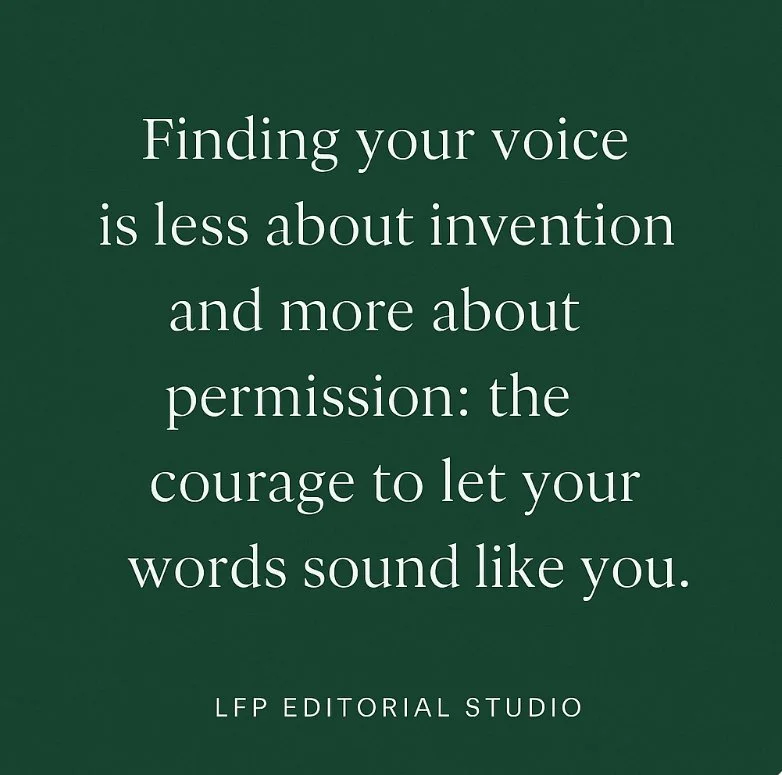What Does ‘Finding Your Voice’ Actually Mean?
You hear it everywhere: “You need to find your voice.” It’s advice passed between writers like a secret key, as though once you find it, the doors of clarity, confidence, and publication will swing open.
But what does it really mean?
These are some of my own thoughts - quiet ponderings gathered both as a writer and as an editor who has spent many hours listening, gently coaxing, and holding space for other people’s voices.
I have come to think that ‘voice’ isn’t just a technique or a tone. It’s something much deeper, and sometimes harder to trust.
Writing can be solitary, but finding your voice doesn’t mean going it alone.
Why Voice Can Be Hard to Trust
When people talk about “finding your voice,” it sounds simple. Like it’s something waiting in a drawer, ready to be picked up and worn with ease.
But the truth is, your voice is personal. And anything personal can feel vulnerable.
Sometimes your voice feels too raw - too informal, too emotional, too different from the polished tone you think you’re “supposed” to have. Other times, it feels too small, as though it couldn’t possibly hold weight or earn attention.
And so you hold back. You reach for borrowed styles, second-hand phrases, or safe, tidy sentences that sound like someone else. Because trusting your own voice means admitting that your words matter, and that someone might judge them.
But here’s the shift: your voice doesn’t need to be perfect. It just needs to be real. Readers don’t connect with flawless sentences. They connect with authenticity, rhythm, and the honesty that seeps through when you stop sanding off every edge.
Finding your voice is less about invention and more about permission: the courage to let your words sound like you.
Voice Isn’t Just Style
Voice isn’t just about how you write. It’s not simply your sentence structure, punctuation preferences, or how fond you are of em-dashes (or not!).
It’s about the lens through which you see the world. The stories you tell. The truths you reveal (even when you’re not trying to). It’s the tone, rhythm, and feeling behind the words, and how they all come together to sound like you.
Essentially, it’s the difference between writing that feels generic and writing that pulses with life.
Voice Comes From the Inside Out
You certainly can’t manufacture your voice by copying another writer or using the ‘perfect’ template.
Voice emerges when you trust yourself enough to write what you truly think, and how you truly feel. It grows when you stop second-guessing every sentence and start leaning into your quirks, your rhythms, and your own turns of phrase.
It also deepens when you’ve lived a little; when you’ve had time to reflect, to rage or to rest.
Your Voice Might Not Be What You Expect
Sometimes, your voice will surprise you. You might think you’re going to write something soft and lyrical, but what comes out is sharp, observant, or even funny.
That’s okay. That’s you, too.
Your voice is a moving thing. It shifts as you grow - and that doesn’t mean you’ve lost it. It means you’re alive to your experiences, and your writing is keeping pace.
Voice and Vulnerability Go Hand-in-Hand
Letting your real voice out on the page can feel exposing. Vulnerable, even.
You might worry it’s too much. Or not enough. Or not clever, polished, poetic, or powerful enough.
But here’s the thing: readers don’t connect with perfection. They connect with truth. With clarity. With the quiet courage it takes to write something real.
When you stop trying to sound impressive and start sounding human - that’s the moment when your voice lands.
So, How Do You ‘Find’ Your Voice?
You don’t ‘find’ your voice by staring at the screen, waiting for inspiration to strike. You find it by writing. By keeping writing. By editing what you’ve written. And sometimes, by talking it through with someone who knows how to listen for it.
That’s where I come in.
At LFP Editorial Studio, I offer more than technical clean-up - I help you tune into your voice, whether you’re writing for creativity or business.
If you’re wondering whether your voice is “good enough” - it is. You just might need help bringing it into focus.
Let’s bring it forward, together.

